News
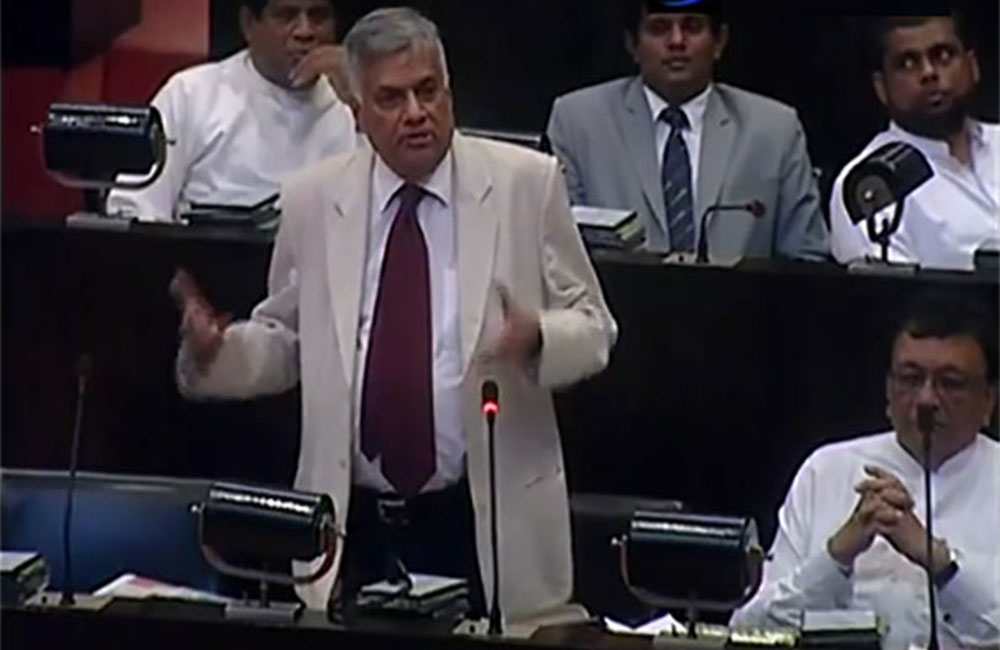
Ranil questions media on 'fake' minister list
Prime Minister Ranil Wickremesinghe severely criticized media in parliament today over the circulation a 'fake' list of nominations for Cabinet portfolios allegedly sent to president Maithripala Sirisena.
The premier alleged that the media was reporting that this fake list was rejected by president Sirisena.He also stated that some media had claimed that SLFP parliamentarian Wijith Vijayamuni Zoysa was included in the list of MPs nominated for ministerial portfolios but pointed out that he was never included in the list.
PM Wickremesinghe slammed media for attempting to mislead the public and called for a parliamentary debate next month on false and inaccurate reporting. He insisted that action must be taken against media outlets that have purposely mislead the general public.
The fake list of proposed ministers is found below: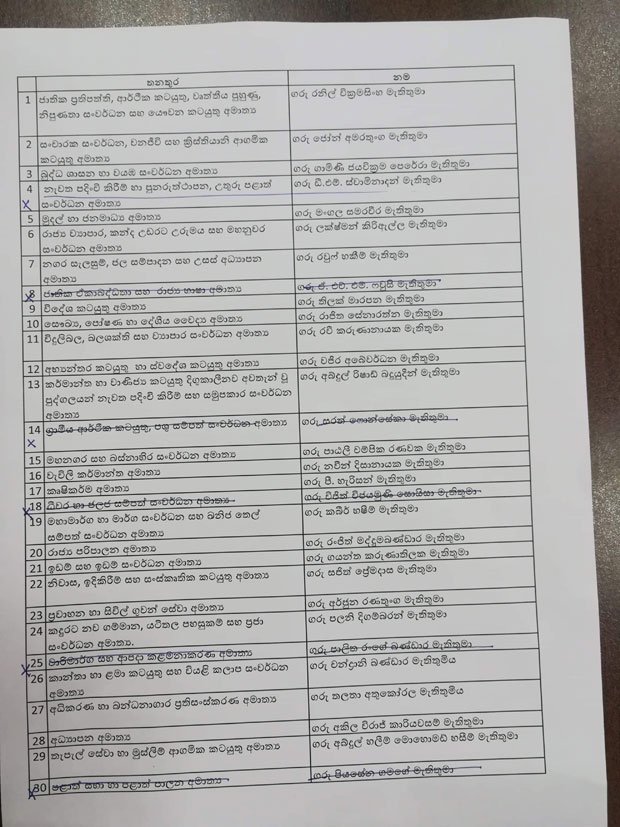
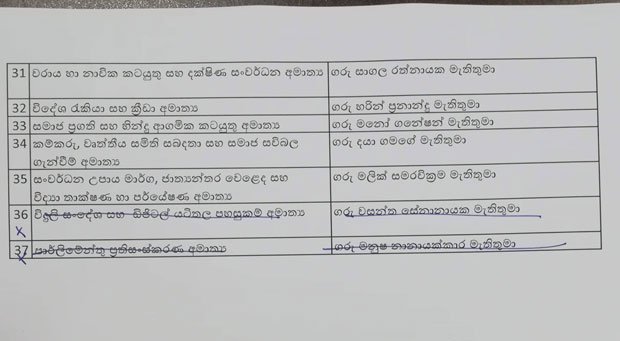
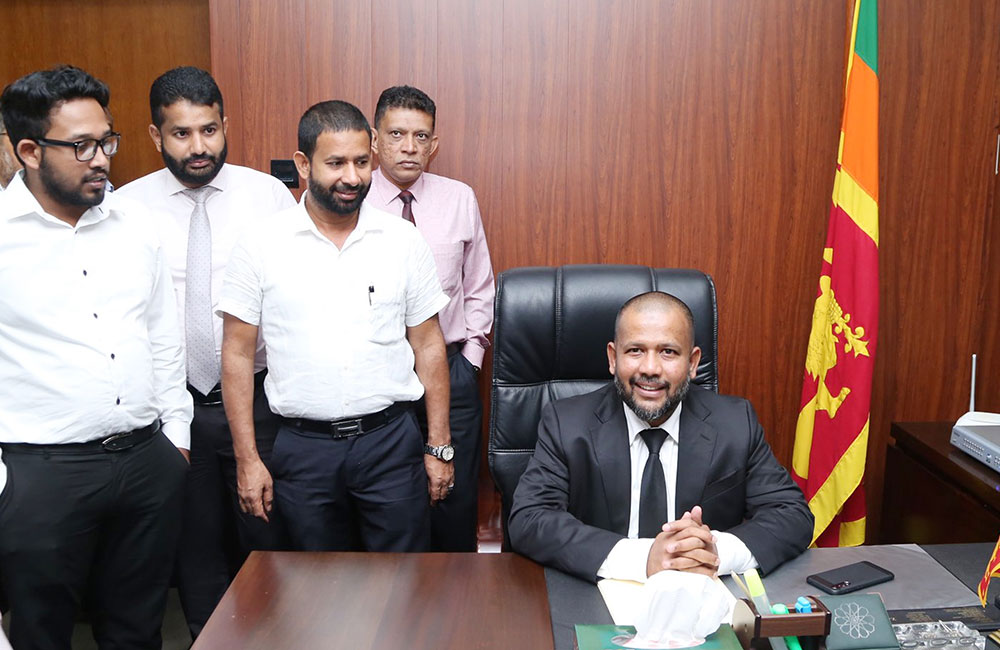
Rishad vows to recover IDP funds slashed by Rajapaksa Cabinet
Minister of Industry and Commerce, Rishad Bathiudeen, who has been given a bigger Ministerial mandate on 20 December, welcomed Prime Minister Ranil Wickremesinghe’s entry to the Northern development work-and vowed to re-instate IDP funds wrongfully slashed by the recently dismissed administration.
"These long term IDPs, most of whom are Muslims in Northern Province, have suffered for the longest period since the war times. Resettlement and welfare support by the government is vital since there is no one else to spend for them. Before our former Cabinet was replaced by the illegal government of October 26 with its new Cabinet, the former Cabinet had approved funds for resettlement of these old IDPs. The approval was a thorough process, and it was also cleared by the policy Planning Ministry of previous Cabinet. Using these approved allocations, resettlement work already started from August 2018. It is unfortunate that the disputed PM slashed Rs 250 Million from this ongoing allocations, leaving these IDPs in great difficulty," he said.
"Despite leading an illegitimate government, he has even instructed to divert this Rs 250 million for other work away from IDP resettlement. This is an illegal action and harms the ongoing resettlement process of IDPs," Bathiudeen added.
After his re-appointment today Minister Bathiudeen now heads Sri Lanka’s Ministry of Industry and Commerce becoming the only Cabinet Minister to hold this portfolio for the fourth term.
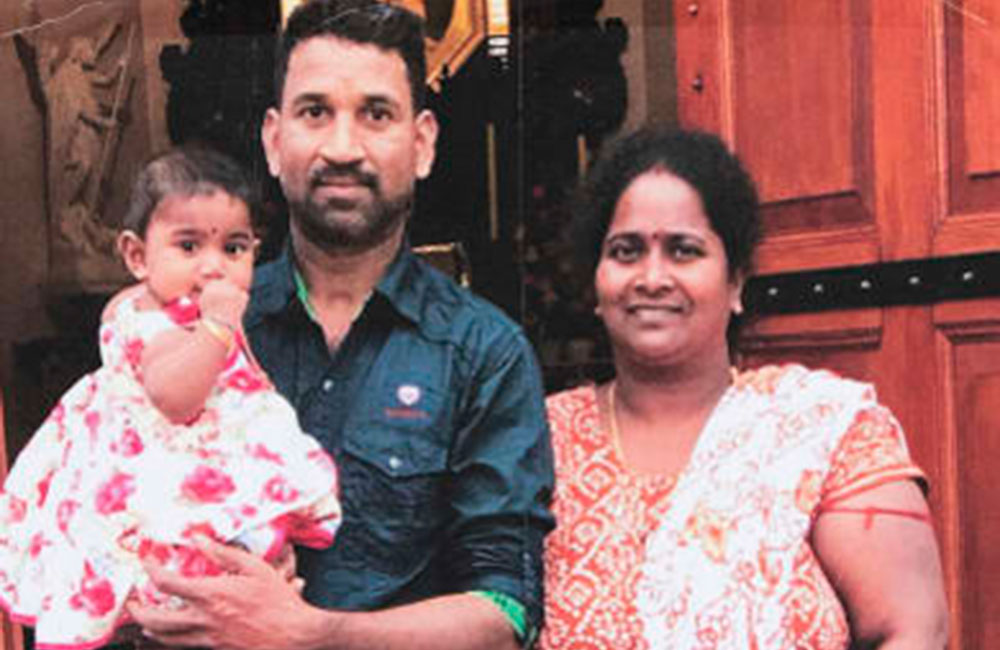
Australia orders the deportation of Sri Lankan family
A Tamil refugee family who made a home for themselves in the small Queensland town of Biloela have lost their appeal to stay in Australia.
Nadesalingam and Priya came to Australia separately by boat in 2012 and 2013 following Sri Lanka's civil war.
They settled in Biloela, where they became ingrained in the local community.The Federal Court on Friday dismissed Nadesalingam, Priya and their two daughters' bid to remain in the country.
But Justice John Middleton ordered they not be deported back to Sri Lanka until after 4pm on February 1, given the time of year and so they had an opportunity to consider their options.
Australian Border Force officials removed the family from their home in March, one day after Priya's bridging visa expired.
They have been detained in a Melbourne immigration centre for the past nine months.
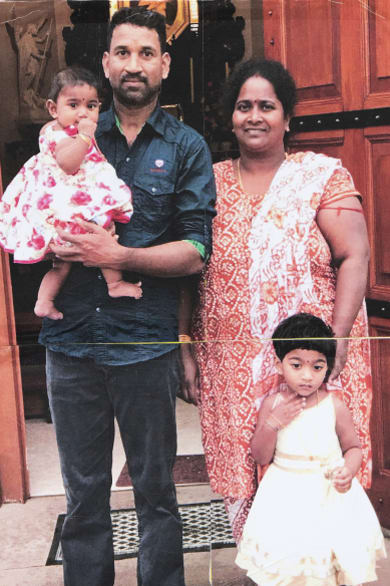 Sri Lankan Tamils Priya and Nadesalingam and their two Australian-born children, from Biloela in Queensland, who lost a bid to stop their deportation.Credit:AAP
Sri Lankan Tamils Priya and Nadesalingam and their two Australian-born children, from Biloela in Queensland, who lost a bid to stop their deportation.Credit:AAP
The family were issued with a deportation notice in June after the federal government ruled they couldn't stay.
But their removal from Australia was put on hold after they made an 11th-hour appeal to the Federal Court in August.
Friend Brad Coath, who was in court when Friday's decision was handed down, said the family would be devastated.
"Nadas and Priya are keeping an incredibly brave face but it's tough as you can imagine," he said.
Mr Coath said their Australian-born daughters, aged one and three, were particularly doing it tough, having developed nutritional deficiencies and developmental issues as a result of being in detention.
 Family friend Brad Coath (left) is seen outside the Federal Court in MelbourneCredit:AAP/Daniel Pockett.
Family friend Brad Coath (left) is seen outside the Federal Court in MelbourneCredit:AAP/Daniel Pockett.
Friend and Biloela resident Angela Fredericks described the family's ordeal as "pure psychological torture".
"Each time they're getting more and more exhausted. It's just the psychological drain of not knowing and the constant fear (of returning to Sri Lanka)," she said.
Ms Fredericks said she was disappointed with the court ruling but grateful the family wouldn't be deported until February.
She said it gave them time to consider their options, including if they wanted to take the case to the High Court.
"It gives us time to keep the pressure on Home Affairs Minister Peter Dutton to step in," she said.
More than 140,000 people have signed a petition urging Mr Dutton to return the family to Biloela.
Ms Fredericks said the small town community would now put more pressure on the government to intervene.
"We will be back fighting with phone calls daily, sending letters and emails, basically inundating them," she said.
Nadesalingam and Priya came to Australia separately by boat in 2012 and 2013 following Sri Lanka's civil war.
They settled in Biloela, where they became ingrained in the local community. (AAP)
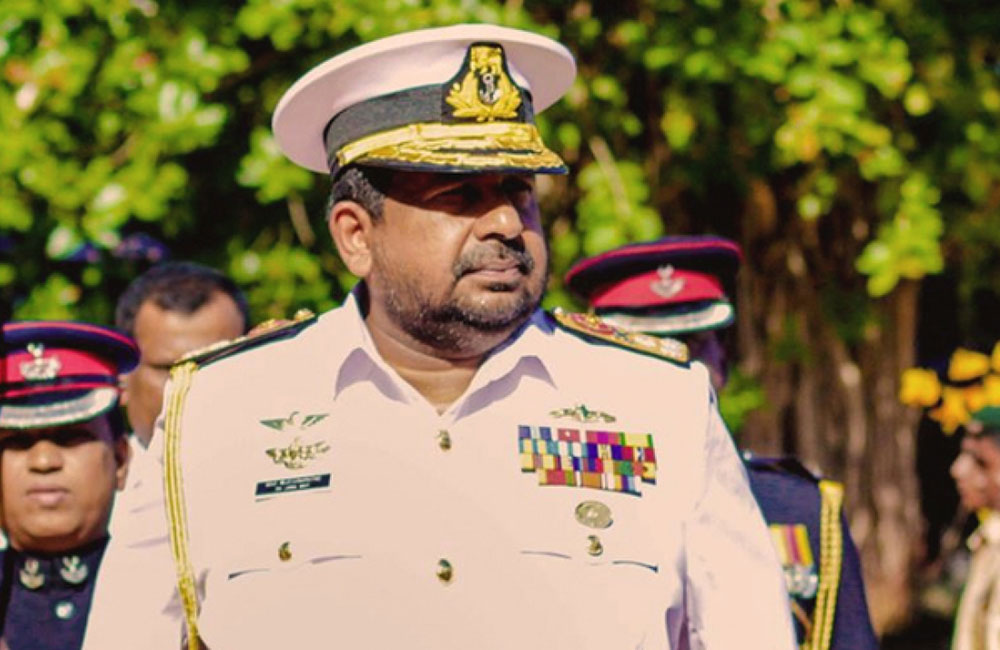
CCD takes over investigation into threats to witness of Navy abduction case by CDS Wijegunaratne
The investigation into the allegation that Chief of Defense Staff Admiral Ravindra Wijegunaratne threatened the main witness in the case of abduction of 11 youths has been taken over by the Colombo Crime Division (CCD).
It was informed to court yesterday that the investigation into the incident conducted by the Fort Police had been taken over by the CCD on the orders of the Senior DIG in charge of the Western Province. The OIC of the Colombo Crime Division also made a request to fix a date to present the progress of the investigation in a B report.
Accordingly, the Magistrate ordered the Colombo Crimes Division to appear before the court with the Fort Police on January 19 regarding the incident.
The Chief of Defense Staff was arrested and remanded last month for assisting Navy Lieutenant Commander Chandana Prasad Hettiarachchi alias Navy Sampath, the main suspect in the abduction and disappearance of 11 Tamil youths to evade court.
The main witness of the case, Lieutenant Commander Galagamage Laksiri Geethal has lodged a complaint in the Fort Police that he was attacked by the CDS and his aides at the Navy Headquarters in Colombo last month.
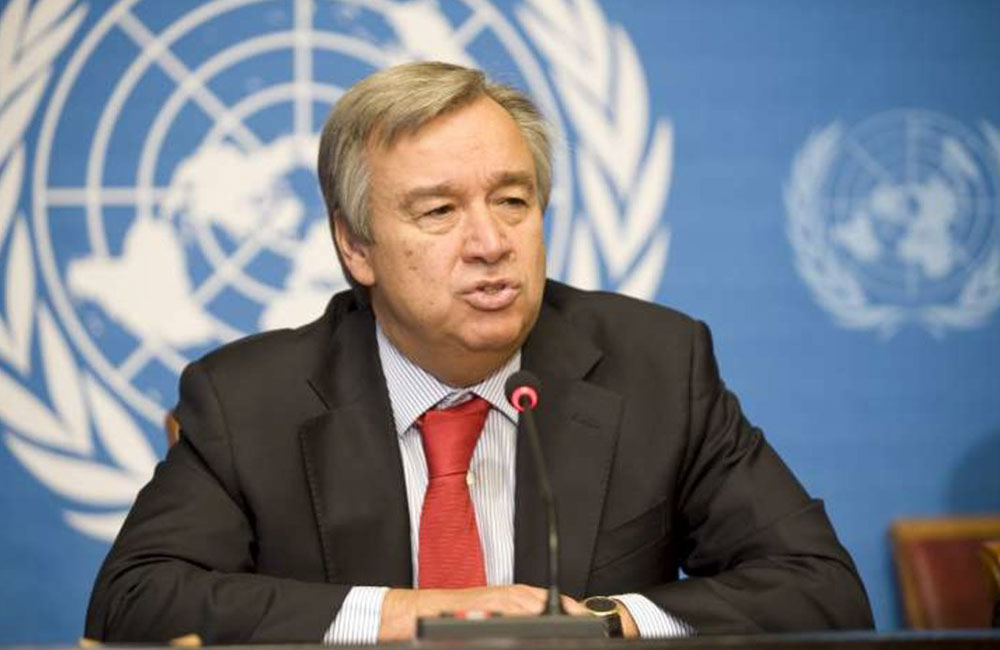
UN Secretary General welcomes resolution of crisis
The Secretary-General of the United Nations Antonio Guterres has welcomed the resolution of the political crisis in Sri Lanka and called on all the political actors to resolve all outstanding differences in the interest of people of the country.
“The Secretary-General welcomes the resolution of the political crisis in Sri Lanka through peaceful, constitutional means, and applauds the resilience of the country’s democratic institutions,” Guterres’ spokesman Stephane Dujarric told reporters at a press briefing on Thursday.
The Secretary-General also called on all political actors to seize the opportunity of the appointment of the new cabinet to resolve outstanding political differences in the same spirit of respect for democracy and in the interest of the people of Sri Lanka.
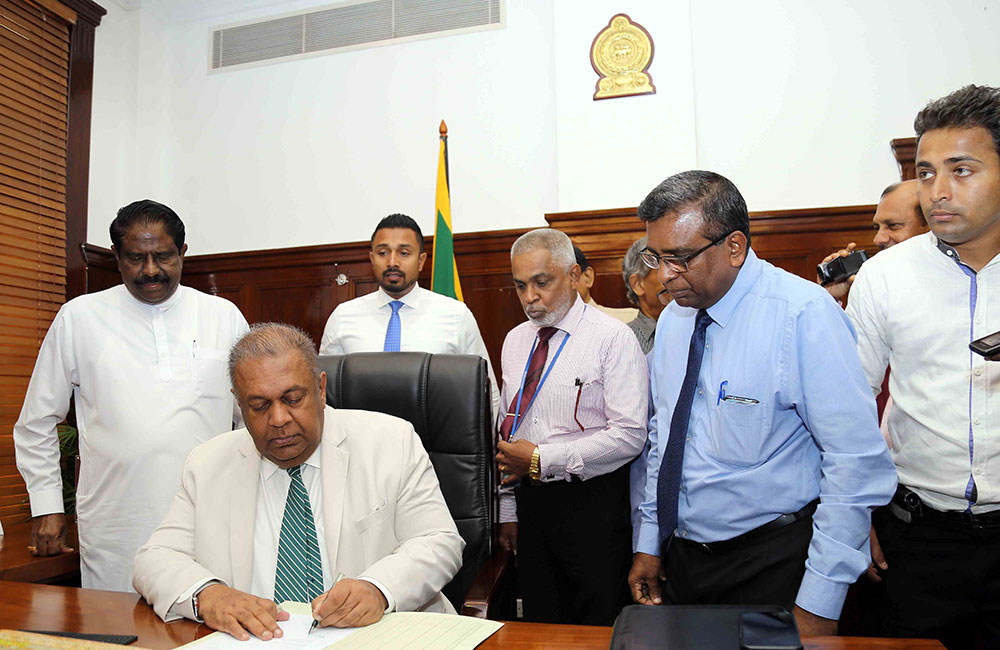
Vote of Account to cover expenditures of the first four months of 2019: Mangala
Assuming duties as the Minister of Finance and Media at the Treasury today, Mangala Samaraweera said that a vote account will be presented in parliament tomorrow to cover the expenditures of the first four months of 2019.
Samaraweera said that the Cabinet of Ministers granted approval to the vote of account, today (20).Accordingly, LKR 1,765 billion have been allocated for expenditure from which LKR 970 billion have been allocated for debt servicing.
Furthermore, LKR 480 billion rupees have been allocated for recurring expenditure while LKR 310 billion have been allocated for capital expenditure.

Fuel Price Formula reintroduced: Oil prices slashed
The price of fuel will come down from midnight today, Finance and Media Minister Mangala Samaraweera said in Parliament.
Samaraweera said that he will reintroduce the fuel pricing formula when he assumed duties as the new Minister of Finance at the Treasury, yesterday (20).
The new price of fuel is listed below.
- Price of 92 octane Petrol reduced by Rs 10 (New price Rs 125)
- - Price of 95 octane Petrol reduced by Rs 10 (New price Rs 149)
- - Price of Auto Diesel reduced by Rs 5 (New price Rs 101)
- - Price of Super Diesel reduced by Rs 10 (New price Rs 121)
The illegal administration of Mahinda Rajapaksa had temporarily suspended the fuel pricing formula with the Rupee falling from 173 to 180 against the US dollar during the coup.
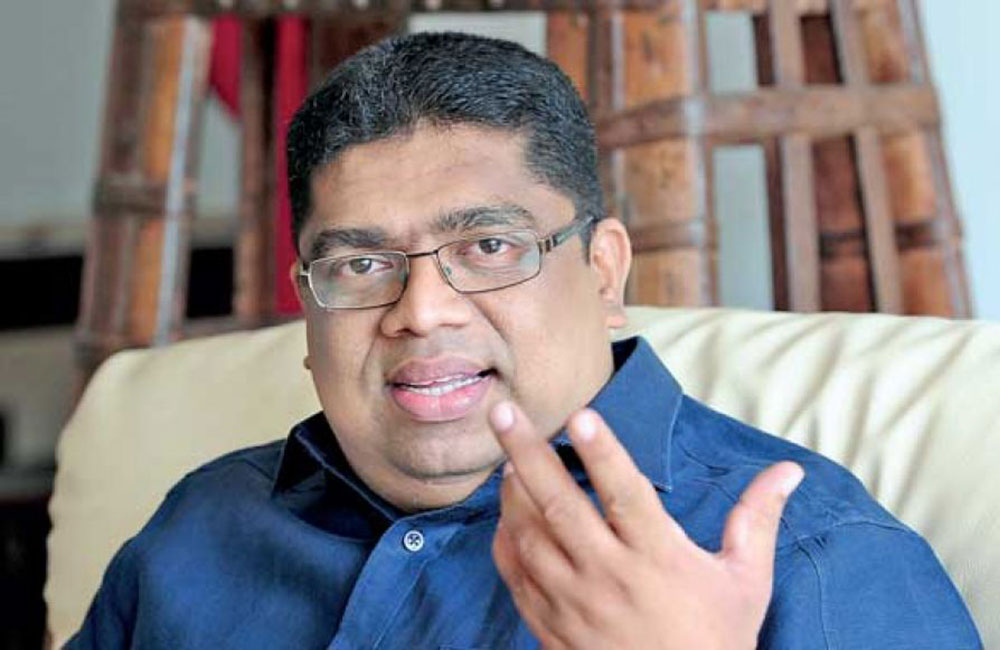
Forcibly Ousted Lake House Chairman returns!
Krishantha Cooray, Chairman - Associated Newspapers of Ceylon Ltd. returned to Lake House today after a hiatus of over one month. He was forcibly removed when Sri Lanka Podhuajana Peramuna Party Leader Mahinda Rajapaksa grabbed power in a political coup in October. Later Wasantha Priya Ramanayake replaced Cooray as Acting Chairman while the MR faction attempted to consolidate power. Dinesh Dodangoda was appointed as Director Editorial.
However, Cooray, who remained the rightful Chairman returned to Lake House today amidst cheers of the employees who greeted him and escorted him. Cooray and his Predecessor Kavan Ratnayake made significant changes in Lake House during their tenures especially attempting to modernize the institution by introducing modern editorial concepts and forming a new media department. But in weeks Ramanayake and the new appointees dismantled the new introductions taking the institution back to its known archaic concepts and methods.

State media heads ousted by the illegal administration to be reinstated
Media Minister Mangala Samaraweera has instructed relevant authorities to reinstate the State Media Heads that were in office before the constitutional coup. The then illegal government had replaced all media heads immediately after October 26th.
Accordingly, Thilaka Jayasundara (ITN), Siddik Farook (SLBC), Inoka Sathyangani (SLRC) and Krishantha Cooray (Lakehouse) are to be reinstated as chairpersons of State media institutions.
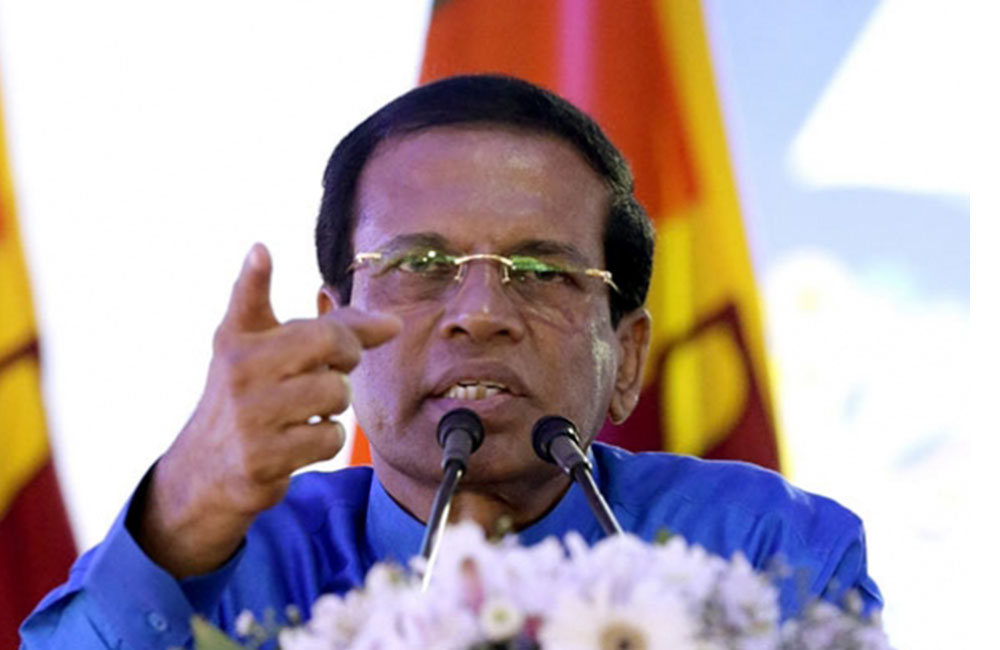
President continues to curtail Media freedom : Journalists
Journalists and activists took to social media today to voice their dissent against President Maithripala Sirisena barring the media yet again by denying them permission to attend the swearing in of the cabinet ministers today. The President in just the last two months not only barred the media from the illegal swearing in ceremony of MP Mahinda Rajapaksa as the country’s de facto Prime Minister but also blocked them from attending the swearing-in of Prime Minister Ranil Wickramasinghe over the weekend.
Writer Nalaka Gunawardene was seen questioning why the President is afraid of the media and what he is trying to hide. Others reminded that it was the same person who promised to uphold media freedom at all times.
Meanwhile, though the Ministry of Mass Media has been handed over to Minister Mangala Samaraweera sources say the President has expressly requested that Rupavahini Corporation and Lake House remains in his control.
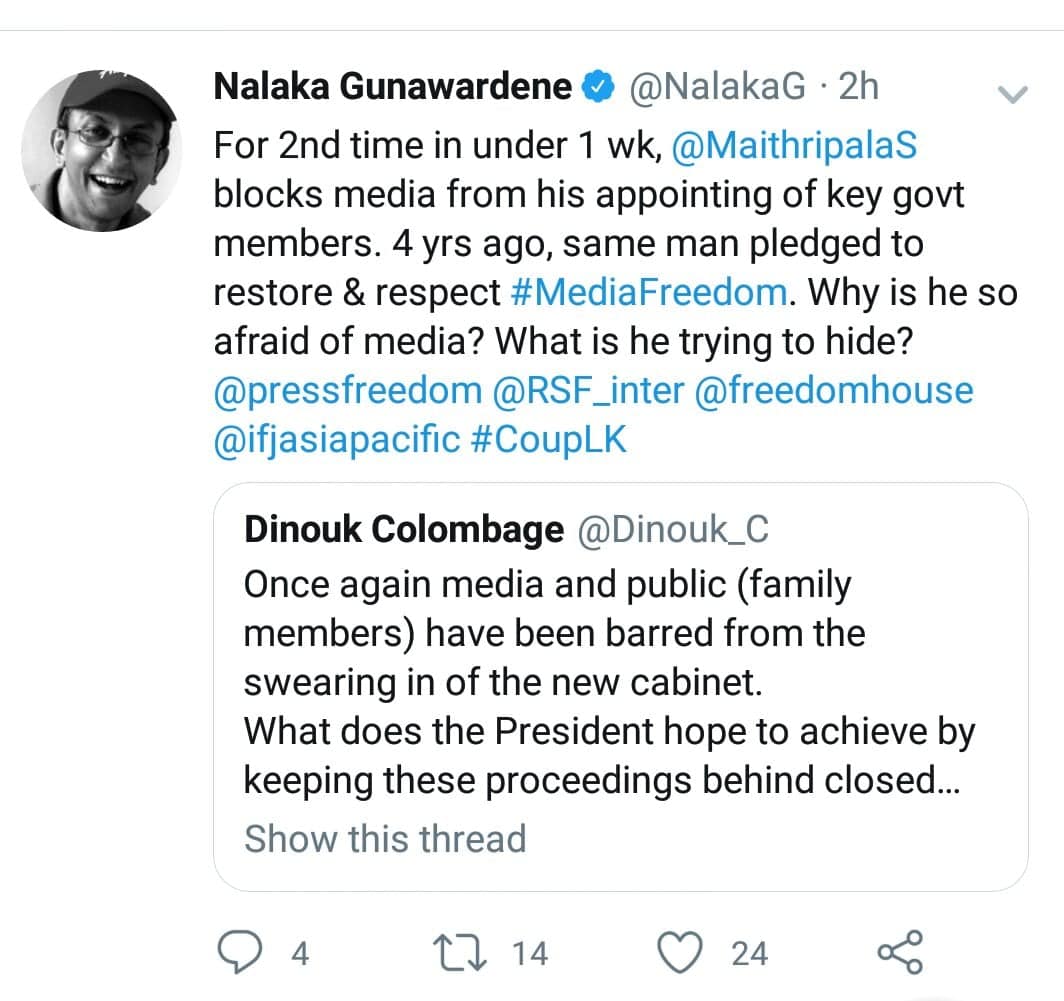
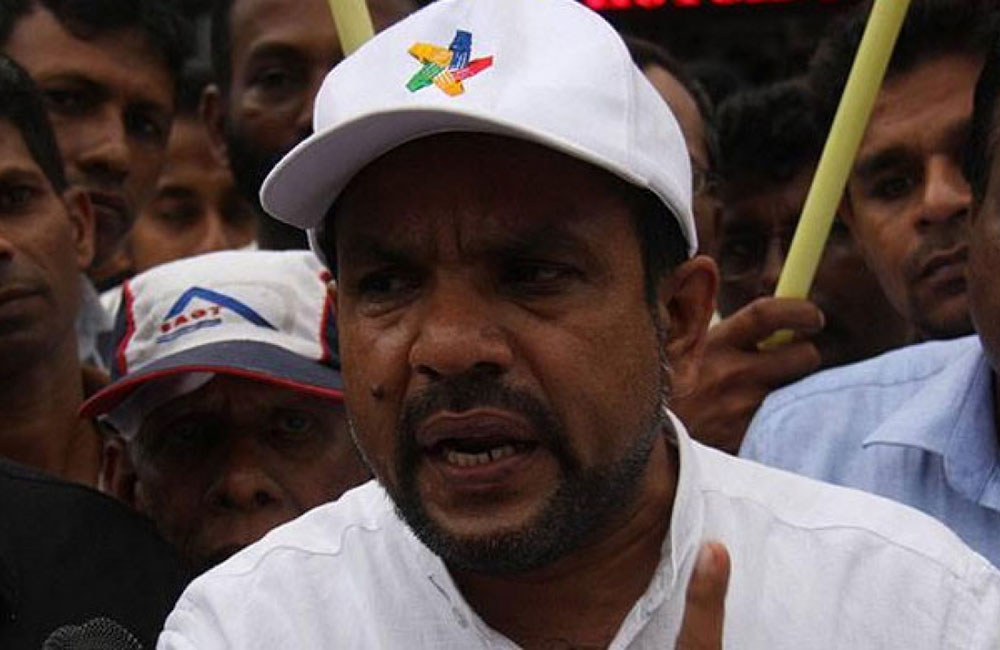
Parliamentarian Ranjith Zoysa arrested for assault
UPFA MP Ranjith de Zoyza, who recently joined the Sri Lanka Podujana Peramuna, has been arrested on charges of assaulting a person, Police media spokesperson said.
Police said that four others were also arrested in connection to the assault that had taken place in Godakawela.
After being produced before the Pelmadulla Magistrate’s Court, the suspects were ordered to be remanded until the 01st of January.
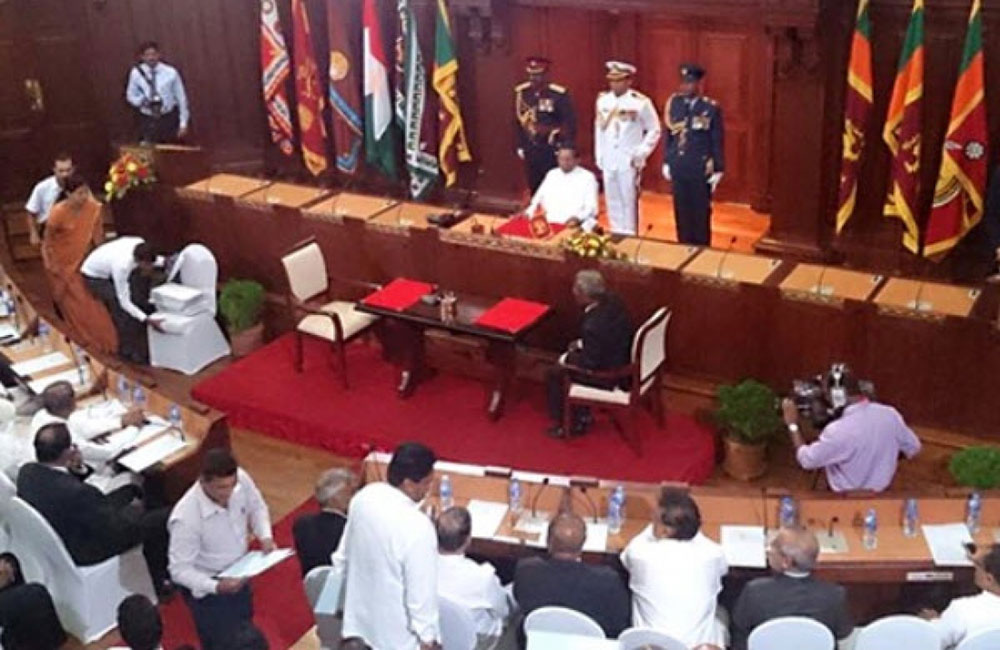
new-cabinet-sworn-in-full-list-of-ministers
The swearing in of the new Cabinet of Ministers commenced at the Presidential Secretariat under the patronage of President Maithripala Sirisena, a short while ago.
Accordingly, the following parliamentarians were appointed as Cabinet Ministers.
Prime Minister Ranil Wickremesinghe - Minister of National Policies and Economic Affairs, Northern Development, Vocational training and Skill Development, Rehabilitation and Resettlement, and Youth Affairs
John Amaratunga - Minister of Tourism Development, Wildlife and Christian Affairs
Gamini Jayawickrama Perera - Minister of Buddha Sasana and Wayamba Development
Mangala Samaraweera - Minister of Finance and Mass Media
Lakshman Kiriella - Public enterprise, Upcountry Development and Kandy Heritage
Rauf Hakeem - Minister of City Planning, Water Supply and Higher Education
Thilak Marapana - Minister of Foreign Affairs
Rajitha Senaratna - Minister of Health and Indigenous Medicine Kabir Hashim - Minister of Highways, Road Development and Petroleum Resources Development
Ranjith Maddumabandara - Minister of Public Administration and Disaster Management
Gayantha Karunatilake - Minister of Lands and Parliamentary Reforms
Sajith Premadasa - Minister of Housing Construction and Cultural Affairs
Arjuna Ranatunga - Minister of Transport & Civil Aviation
Ravi Karunanayake - Minister of Power, Energy and Enterprise Development
Akila Viraj Kariyawasam - Minister of Education
Malik Samarawickrama - Minister of Development Strategies, International Trade and Science, Technology and Research
Vajira Abeywardena - Minister of Internal and Home Affairs and Provincial Councils and Local Government
Patali Champika Ranawaka - Minister of Megapolis and Western Development
Navin Dissanayake - Minister of Plantation Industries
Palani Thigambaram - Minister of Hill Country New Villages, Infrastructure and Community Development
Chadrani Bandara - Minister of Women and Child Affairs and Dry Zone Development
P. Harrison - Minister of Agriculture, Rural Economic Affairs, Livestock Development, Irrigation and Fisheries and Aquatic Resources Development.
Hon. Harin Fernando - Minister of Telecommunications, Digital Infrastructure, Foreign Employment and Sports
Daya Gamage - Minister of Labour, Trade Union Relations, and Social EmpowermentAbdul Haleem - Minister of Postal Services and Muslim Religious Affairs
Sagala Ratnayaka - Minister of Ports and Shipping and Southern Development
Mano Ganesan - Minister of National Integration, Official Languages, Social Progress and Hindu Religious Affairs
Page 372 of 534